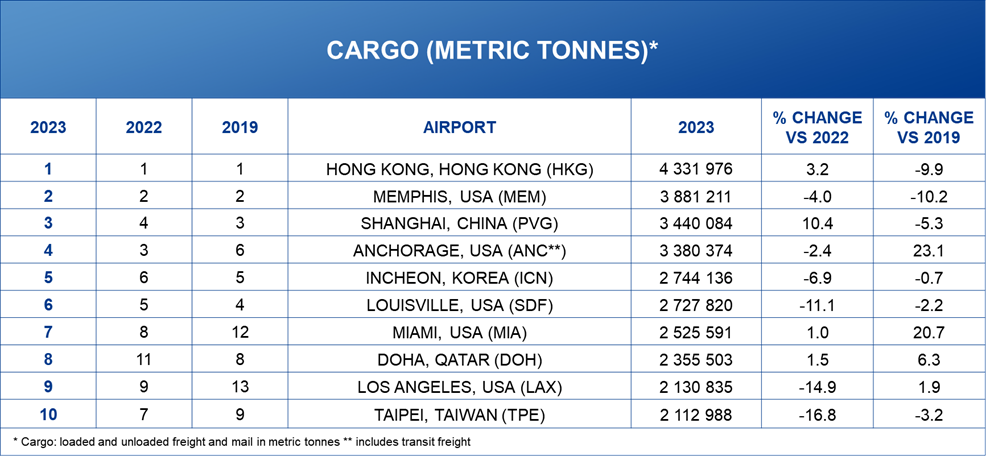Hong Kong remains busiest cargo airport as US hubs struggled
15 / 04 / 2024

Hong Kong International Airport (HKIA) last year retained its position as the world’s busiest cargo airport, while US hubs reported some of the largest declines amongst the world’s top 10 freight hubs.
Provisional figures released today by Airports Council International (ACI) show that HKIA registered a 3.3% year-on-year increase in cargo volumes last year to 4.3m tonnes.
It is the 13th time since 2010 that HKIA has been the busiest cargo airport in the world.
However, its figures remain down on 2019 levels when the airport handled 4.8m tonnes as passenger operations last year were still in recovery mode following the Covid pandemic.
The airport lost the top spot in 2020 due to the Covid pandemic and related drop-off in passenger flying.
Jack So, Chairman of Airport Authority Hong Kong (AAHK), said: “We are proud to have claimed once again the top spot for air cargo throughput. This accomplishment demonstrates HKIA’s resilience, unparalleled efficiency and world-class cargo services.
“Air cargo is a key driver of the growth of Hong Kong’s logistics industry and overall economic development. AAHK shall continue to work tirelessly with our air cargo community to further strengthen HKIA’s competitiveness as a global cargo hub.”
Looking ahead, the airport said that it will be able to handle up to 10m tons of cargo once its three-runway system is implemented later this year.
Meanwhile, it has also been investing in catering for high-value and fast-growing segments, such as e-commerce. Last year, HKIA saw the completion of the Cainiao Smart Gateway, developed by Alibaba Group’s logistics arm, and the expansion of DHL’s Central Asia Hub which increased its capacity by 50%.
Meanwhile, UPS has announced its plan to establish a new hub facility at HKIA.
Air cargo volumes in the top 10 overall — representing around 26% of the global volumes in 2023 — were down 3.5% year on year in 2023 to 29.6m tonnes.
The overall air cargo market is estimated to have declined by around 3.1% year on year in 2023.
“The decline can be attributed to the ongoing geopolitical tensions and disruptions to global trade and supply chains,” said ACI.
Another notable trend is the drop in demand at US airports. Four of the six airports that reported declines last year were US based: FedEx home hub Memphis, Anchorage, UPS’ home in Louisville and Los Angeles.
Both FedEx and UPS reduced flying last year due to lower parcel demand while IATA said that US airlines reported the largest fall in demand of any region last year.
Miami was the only US airport in the top 10 to report an increase in demand last year.
Other top 10 cargo airports to report a decline were Taipei and Incheon, with the former reporting the largest year-on-year decline of all the airports in the top list.
Shanghai PVG reported the largest percentage increase as its volumes continued to recover following the Covid pandemic.














